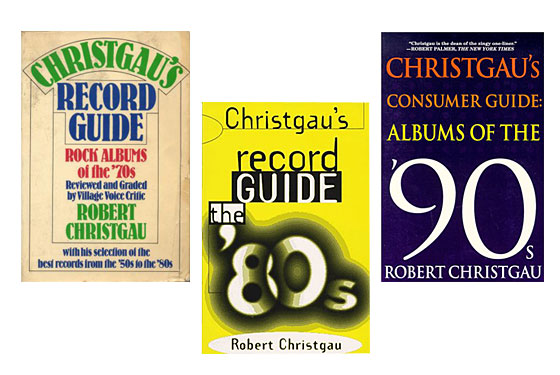
The final installment of Robert Christgau’s “Consumer Guide” column appeared last week, almost exactly 41 years after the first one ran in the July 10, 1969 Village Voice. Christgau’s not retiring as a music critic; it’s MSN that’s retired his monthly-ish assessment of a big pile of albums, each record carefully, unsparingly, and often hilariously addressed in a few dozen words with a letter grade as a final punch line. That amounts to upwards of 12,000 album reviews: a Pepys’ diary of four decades of commercially available recordings, filtered through the idiosyncratic taste of somebody who made it his job to be really well informed about as much pop music as one human being could listen to.
The title of the “Consumer Guide” was a serious joke — it was probably a little unfashionable in 1969 for a music critic to present his work as market-based service journalism. (Disclosure: I know Christgau a little and have worked with him in various contexts.) Still, it’s a perfectly reasonable assertion that a music critic’s reader has less time and money to spend on new records than the critic, and should therefore be guided toward the best value-for-money, aesthetic and otherwise. (That was always a big one with the “Consumer Guide”: Christgau unfailingly pointed out when an LP’s running time was under half an hour.)
The earliest “Consumer Guide” columns were largely brief, descriptive comments. Christgau’s entire review of Lotti Golden’s Motor-Cycle, for instance, ran “I don’t like this myself, but I also don’t like Laura Nyro. If you do, you might glance at the lyrics on the back of the jacket and find out if you’re interested.” Within a few years, though, he developed his particular gift for “power, wit and economy,” a phrase he used to describe the Ramones in a dead-on 37-word review of Leave Home. Fans of the guide like to trade favorite “Consumer Guide” lines: “Sting wears his sexual resentment on his chord changes like a closet ‘American Woman’ fan”; “Calling Neil Tennant a bored wimp is like accusing Jackson Pollock of making a mess”; “Mick Jagger should fold up his penis and go home.”
In 1981, Christgau’s Record Guide: Rock Albums of the ‘70s appeared, the first of three volumes collecting, expanding, and extensively revising his reviews. A decade later, he changed the format of the “Guide” to focus on ferreting out recordings he found particularly special, with additional space for “honorable mentions” (dispatched in a phrase) and “choice cuts” (a category that was more about tracking his taste than arguing for it). Lesser records were largely relegated to noted-without-comment listings of “Duds” and an annual “Turkey Shoot” in the Voice. That meant the loss of his crisp comments about mushy records (on Daryl Hall & John Oates’s Big Bam Boom: “What makes these guys so depressing is their definitive proof that instinctive musicality insures no other human virtue”). But it also meant that he could spend more room on the good stuff, especially the good stuff that wasn’t getting a lot of exposure otherwise.
Part of the reason Christgau’s a hero among music critics is that the dude has the openest ears around, and even if you fume at some of his judgments (Cs and C-plusses for ABBA — humph!), you can’t claim his taste has ever ossified or even stuck within a particular parish. When he says he’s “encyclopedic” about popular music, he means it. There are not a lot of white guys in their 60s waving the flag for Lil Wayne’s Da Drought 3, especially not in the same column as they wave the flag for a Willie Nelson/Merle Haggard/Ray Price trio album, an anthology of new Chinese pop, Vampire Weekend, and Wussy (who? Well, if Christgau gave ‘em an A, maybe you’d best find out).
Another thing: He’s a virtuosic writer. Christgau owns the capsule review the way Alexander Pope owns the heroic couplet. If you’re writing or reading one in 2010, you’re in his debt, whether you know it or not. Hell yes, they’re densely packed — in the final “Consumer Guide” column, his review of LCD Soundsystem’s This Is Happening begins, “Unless you’re down with his clubrat semblables, James Murphy is hard to like, projecting cynicism with that chansonnier-derived Bowie-thrice-removed theatricality the Eurofied slip into like a thrift-store tux.” Every clause demands unpacking (“clubrat sembables” alone!), and rewards it: That’s value-for-money right there. The “Consumer Guide” reviews are an enormous pleasure to read slowly, as writing, even if you have no particular interest in pop music. And if you do happen to have more than a little interest in pop music, they’re a treasure.




